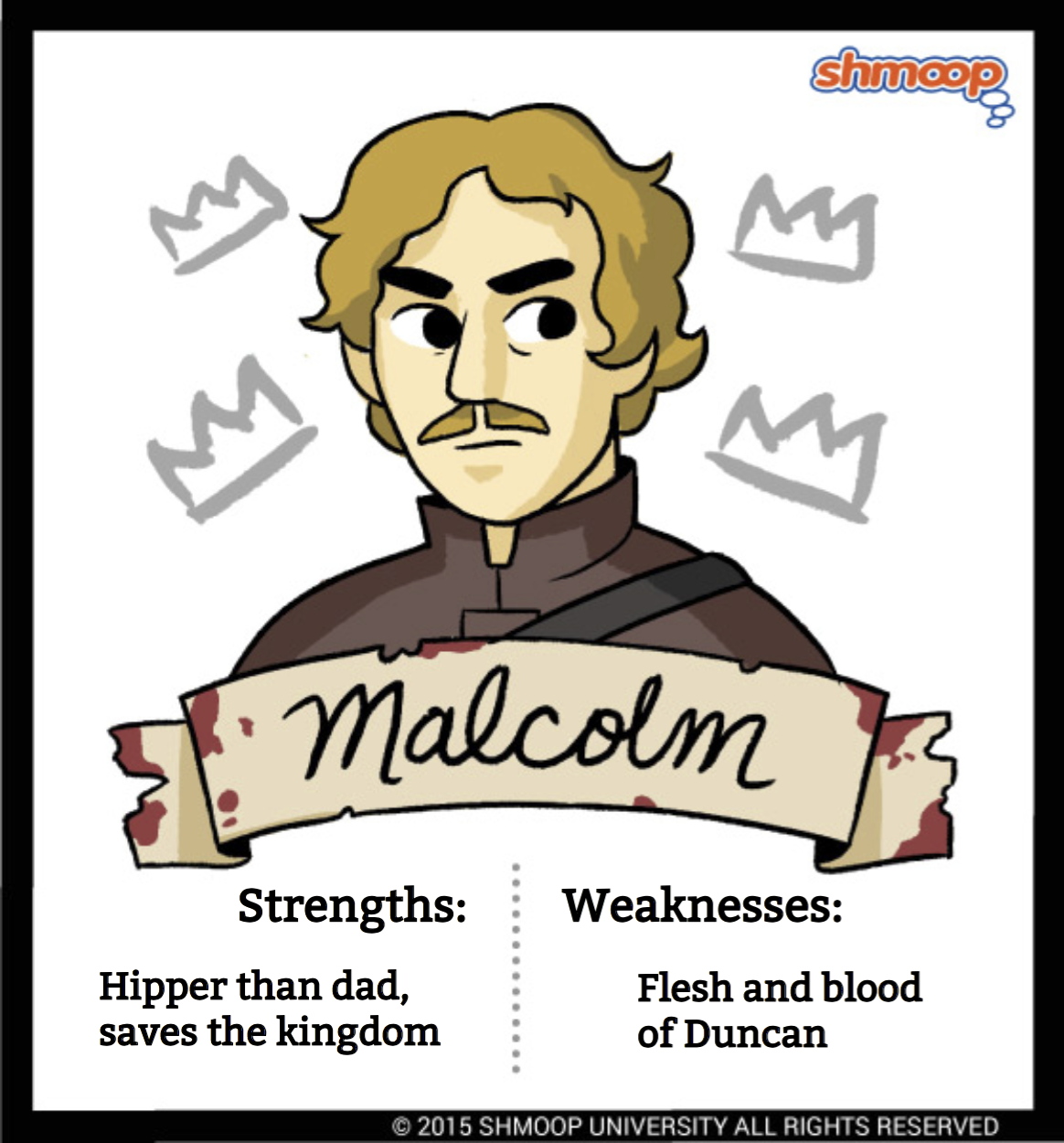Character Analysis

(Click the character infographic to download.)
Malcolm is elder son of King Duncan and newly appointed Prince of Cumberland, i.e. next in line to be King of Scotland. But when we first meet him, he's standing around praising a "good and hardy soldier" for saving his life and rescuing him from capture. Is Malcolm just another king who needs saving, or is he going to be a great king?
Growing Up is Hard to Do
Malcolm may not be alternating between nudity and unfortunate costume choices, but he doesn't start out impressing us as king material. When his father is murdered, he doesn’t know what to do and so he decides to run, saying "This murderous shaft that's shot/ Hath not yet lighted, and our safest way/ Is to avoid the aim" (2.3.167-169). (Translation: let's get out of here until we see how things play out.)
When he meets Macduff, who complements him in courage and experience, he starts to get it together. He comforts Macduff after the man's children and wife are killed, saying "Dispute it like a man" (4.3.259), and he helps come up with and carry out the plot that wins the kingdom back from Macbeth.
He also shows himself to be much savvier than his dad. To test Macduff's honor, Malcolm pretends that he's even worse than Macbeth: he says that there's "no bottom, none,/ In my voluptuousness"; that he's so greedy that he'd steal jewels and lands from the nobles; and that he lacks any kingly virtues. What virtues, you ask?
justice, verity, temperance, stableness,
Bounty, perseverance, mercy, lowliness,
Devotion, patience, courage, fortitude (4.3.108-110)
Only when Macduff is practically ripping his hair out with despair about "O Scotland, Scotland," and "thy hope ends here" (4.3.17) does Malcolm go, "Psych!" Turns out, he's none of those things. Not only is he not interested in all of Scotland's maidens, he's actually a virgin. Since that bit isn't true, we can assume that the rest of it isn't, either. Not only isn't he greedy, he just might have every single one of those great, kingly qualities: all the mercy and lowliness of Duncan, along with the courage, fortitude, and stableness that he lacked.
King-Maker
More proof that King Malcolm is going to be just what Scotland ordered? Let's take a look at the play's last lines, which just so happen to be Malcolm's final speech:
We shall not spend a large expense of time
Before we reckon with your several loves,
And make us even with you. My thanes and kinsmen,
Henceforth be earls, the first that ever Scotland
In such an honour named. What's more to do,
Which would be planted newly with the time,
As calling home our exiled friends abroad
That fled the snares of watchful tyranny;
Producing forth the cruel ministers
Of this dead butcher and his fiend-like queen,
Who, as 'tis thought, by self and violent hands
Took off her life; this, and what needful else
That calls upon us, by the grace of Grace,
We will perform in measure, time and place:
So, thanks to all at once and to each one,
Whom we invite to see us crown'd at Scone. (5.7.72-88)
Here, Malcolm praises his friends; gives them a little reward by making them earls; calls back all the exiles; and then, finally, says that he'll do everything that needs to be done, "in measure, time and place." He's reuniting the kingdom, surrounding himself with loyal friends, and promising to take care of the to-do list—all without shedding a single tear.
Sounds good to us.
Malcolm's Timeline